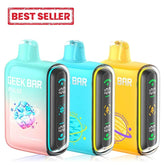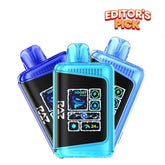Delta 8: Everything You Need to Know

Whether you're a longtime THC user or even just a casual news-reader, you've probably heard of Delta 8 Hemp in the last year or so. Some sources caution its use due to its "synthetic properties", and some hail it as a miracle cure for a list of medical ailments, but the reality is that between these polar opinions, Delta 8 falls square into the middle.
Delta 8 is still being deeply researched, so inevitably the possibility of new risks or rewards could come to the surface. But for now, this is what we know about the substance taking over the 420 industry by storm.
THC vs. Delta 8
The lazy term being thrown around to describe Delta 8 is "synthetic weed". Let's be clear right off the bat: Delta 8 is derived from hemp, yes. Delta 8 bears many similarities to THC, but it is not simply a synthetic re-creation. In fact, the scientific name for THC is Delta 9. Bet you didn't know that (I sure didn't).
So, what is Delta 8? As mentioned before, it is a cannabinoid found in the hemp plant. Although hemp is technically a cannabis plant, the plant is considered "hemp" when it contains 0.3% THC or less, while "cannabis" is typically categorized as containing above 0.3% THC.
Like THC, Delta 8 binds to the body's endocannabinoid system. Unlike THC, Delta 8 molecules binds with a double bond, which is the theorized reason that it is less potent than THC, while still providing qualitatively similar effects.
The most common effects of Delta 8 consumption are euphoria, reduced anxiety, mild sedation, and pain relief, pretty much the same you'd experience from THC, just lesser in sensation. An overuse of Delta 8 can also provide the same undesirable results: dry mouth, red eyes, increased hunger, and in intense cases increased paranoia and anxiety.

A Brief History of Delta 8: Like, Super Brief
Over the past year or so, Delta 8's growth in popularity has skyrocketed, but this isn't a brand-new discovery by any means. In fact, the first partial synthesis of Delta 8 was published in 1941 by Roger Adams and his team at the University of Illinois, and the first total synthesis was achieved in 1965.
Today, Delta 8 is commonly available for use in the form of prepared edibles and atomizer cartridges suffused with cannabis-derived terpenes and is considered a comparable alternative to marijuana. It is also considered safer by many due to its diminished effects compared to THC. In 2021, the New York Times called Delta 8 "one of the fastest growing segments of products derived by hemp".
Delta 8 Legality
Marijuana laws are changing rapidly throughout the U.S., from decriminalization in some states for fully-legal status in others. However, until marijuana consumption becomes federally legal, the situation with Delta 8 remains slightly murky.
The U.S. Farm Bill (passed by Congress in 2018) declared that hemp can be legally grown and used for extractions throughout the United States. As you may recall, Delta 8 is synthesized from hemp and derivative cannabidiol extracts, not directly from cannabis - making it technically federally legal to produce.
However, In August 2020, the United States DEA released an Interim Final Rule (IFR), determining that "all synthetically derived tetrahydrocannabinols remain Schedule I controlled substances" - including Delta 8. The IFR is open for review until October 2021, so until then the future of Delta 8's legality can only be described as a grey area.
Side Note: Delta 8 can be purchased in many brick-and-mortar stores across the nation as well as online. Be advised that the following states prohibit shipping of Delta 8 products:
- Alaska
- Arizona
- Arkansas
- Colorado
- Delaware
- Idaho
- Iowa
- Mississippi
- Montana
- Rhode Island
- Utah

Best Practices for Using Delta 8
While there are scientific speculations and clinical trials suggesting that Delta 8 could potentially act as a treatment for glaucoma, insomnia, and nausea related to chemotherapy, no large clinical studies have been published on the effects of using only Delta 8 for any medical condition as of 2021. If you're looking for an alternative solution to sleeplessness, poor appetite, nausea, or anxiety, consider Delta 8 - just don't expect a miracle cure.
Whether you're using Delta 8 recreationally or as an alternative treatment, it's important to be aware of its potency by comparing its milligram content with the THC products that your body is already familiar with. Delta 8 at a chemical level is less potent than THC, but is often sold in much higher milligram quantities. For example, a THC gummy typically contains 10mg of THC, and often half of a gummy is more than enough for some users. A Delta 8 gummy can contain up to 25mg, which for those comfortable with 5mg at a time, would be significantly too much.
Just like THC, there is such a thing as "too much". A high consumption of Delta 8 can cause that same panicky, heart-pounding sensation that THC can, so the safest and most enjoyable way to enjoy Delta 8 is simply a little at a time. Vaping Delta 8 can create effects in 10 minutes or less and consuming Delta 8 edibles can take up to 2 hours before you feel anything. It's best to start with a small amount, wait for the result, and consider consuming more instead of overdoing it right away.














